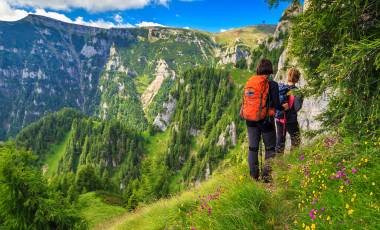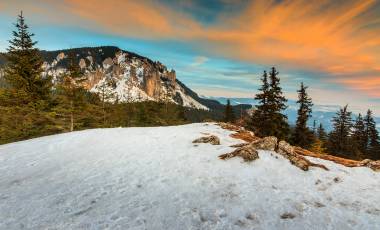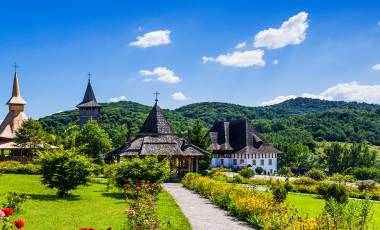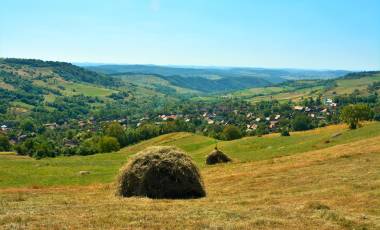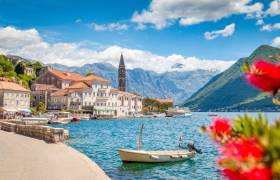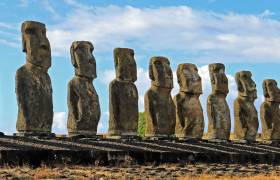This was my first back pack trip ever. It was challenging but exciting and memorable!
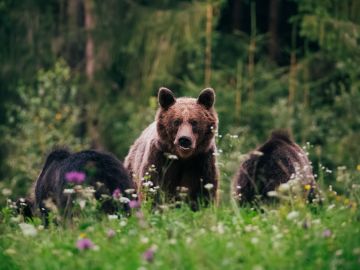
Transylvania Tours
Our Top Destinations in Transylvania
Transylvania Holidays
Top 5 Highlights of Transylvania Holidays
Bran Castle: No trip to Transylvania is complete without a visit to the iconic Bran Castle. Often associated with the legendary character Count Dracula, this medieval castle stands on a rocky cliff and evokes a sense of mystery and intrigue. As you step inside the ancient walls, you’re transported back in time, and you can explore the castle’s labyrinthine corridors and discover its rich history. The stunning architecture and panoramic views of the surrounding countryside make Bran Castle one of the most spectacular sites in Transylvania.
Peleș Castle: Nestled in the picturesque town of Sinaia, Peleș Castle is an architectural masterpiece and one of the most beautiful castles in Europe. Built in the Neo-Renaissance style, the castle boasts ornate decorations, stained-glass windows and lavishly furnished rooms. Intricate woodwork, exquisite artwork and luxurious details adorn the interior of the castle, and the surrounding Carpathian Mountains provide a dramatic backdrop.
Traditional villages: Exploring the charming villages of Transylvania is like stepping back in time. Visit the fascinating Kalibash villages of Magura and Pestera which sprawl along the ridges of the Carpathian Mountains and acquaint you with the rural communities and their centuries-old traditions. It’s intriguing to learn about the history of the villages and their turbulent past when they were invaded by Turks, Mongols and Tartars.
Traditions and Folklore: Transylvania is renowned for its vibrant folklore and traditional customs, which are proudly preserved in its friendly communities. As you immerse yourself in the local way of life, you’ll gain a deeper understanding and love for the region. Indulge in authentic foods, meet local craftsmen and visit old wooden churches. The medieval fortress of Sighișoara, with its colourful buildings and cobbled streets offers a glimpse into the region’s rich history and captivating architecture.
Culinary delights: Transylvania’s cuisine reflects the region’s multicultural heritage with traditional dishes influenced by Romanian, Hungarian and Saxon flavours. From hearty soups like ciorbă and traditional stews like paprikash to mouth-watering desserts such as kürtőskalács, Transylvanian food takes you on a culinary and sensory journey. Explore local markets and indulge in regional delicacies as you discover the distinctive flavours of Romania.
Darinka Shaw Carpathian Walking & Bears
HELEN BRIDGETT Summits of the Transylvanian AlpsThis is a tough week (and I’ve done Kilimanjaro/TMB/Toubkal). Don’t underestimate it. Someone told me that in Romania the trails just go straight up – no zigzags and they really do! The ascents one the first two days are quite technical scrambles /climbs and the descents are absolutely knee-wrecking. So be ready for that and you’ll have a fabulous time!
Melissa Barney Summits of the Transylvanian AlpsIn general, this was a wonderful trip. Or, as the British hikers on the trip would have said, “Brilliant.” However, the six days of hiking actually included a fare amount of scrambling (especially on day 3) — and scrambling is different from hiking. The course description does not adequately describe the amount of and the challenges of scrambling versus hiking. I strongly recommend that you include the amount of scrambling in your course description AND include either a link to a video showing what scrambling is and how to do it or make and include your own video.
FAQs on Transylvania Holidays
Transylvania is famous for many reasons, including its beautiful natural landscapes, medieval fortified churches, the Carpathian Mountains and fairytale castles. Bran Castle, often associated with the legend of Dracula is one of the most famous of all the castles. The region’s rich folklore and traditions that blend the cultures and influences from Romania and Hungary have lured visitors from all across the world. Transylvania’s charming towns and villages, with their well-preserved architecture also add to its allure.
Transylvania not only boasts stunning natural landscapes, but it also has a rich historical and cultural heritage. Firstly, visit the iconic Bran Castle, often associated with the Dracula legend. Enjoy the breathtaking scenery of the Carpathian Mountains and explore the charming medieval town of Sighisoara, a UNESCO World Heritage site, known for its well-preserved citadel. The vibrant city of Cluj-Napoca is also worth visiting with its remarkable architecture, lively squares and thriving arts scene. Journey through the Fagaras Mountains and witness the ancient monasteries at Carta and Sambata de Sus, which is the only Wallachian-style monastery in Transylvania.
With balmy summers and typically snowy winters, Transylvania offers different seasonal experiences and when you travel will depend on what you want to see and do during your trip. January and February are ideal for snowshoeing and winter walks in the Carpathian Mountains but if you prefer to visit when the landscapes are green and filled with flowers, you’re best travelling in the spring or summer months. September is also a good time to visit Transylvania as the temperatures are slightly cooler and make ideal walking conditions.
The region is known for its delicious and diverse cuisine and food lovers will be in their element sampling the local delicacies, which include sarmale (cabbage rolls stuffed with meat and rice), mici (grilled minced meat rolls), papanași (fried cheese donuts), and palinca (a traditional fruit brandy). The rich cultural heritage also includes a wide choice of local cheeses and wines, famous for their distinct flavours. Many of the regional dishes have taken influences from the food of Hungary, Austria and Serbia. Hearty, flavoursome cuisine is made with ingredients such as game, wild mushrooms and seasonal vegetables to create tasty and satisfying meals.
The region plays host to diverse landscapes and is home to a variety of wildlife, including brown bears. If you’re eager to catch a glimpse of these majestic creatures, there are a few places you should visit. The Carpathian Mountains, with their vast forests and protected areas, provide some of the best opportunities to observe bears in their natural habitat. National parks such as Piatra Craiului and Fagaras are also great places to go in search of bears and with purpose-built hides, you’ll have the opportunity to get up close to get up close and personal in complete safety.
Made up of unspoilt landscapes, Transylvania has some fantastic walking trails. Arguably one of the most well known in the region is the Transylvanian Alps Trail, popular for its stunning views of the Carpathian Mountains. The Piatra Craiului National Park also boasts a range of scenic trails filled with a variety of flora and fauna. If you want to soak up the history of the region, the medieval Bran Castle Trail guides you through picturesque villages and ancient ruins. Along the Bucegi plateau, trek to the unusual rock formations, Bucegi Sphinx and Babele.
Snowshoeing offers a unique experience and is a great way to explore the snow-covered landscapes of Transylvania in winter. If you are planning on booking a snowshoeing trip, it’s best to go between December and February when the scenery is drenched in thick snow, and you can enjoy the phenomenal mountain views. Traverse tiny villages, deep gorges and remote valleys that wind among the Carpathian Mountains and experience the traditions of local communities along the way.
Expert Blog Entries
The Adventure Begins Here
Get regular inspiration straight to your inbox from Exodus’ experts.
